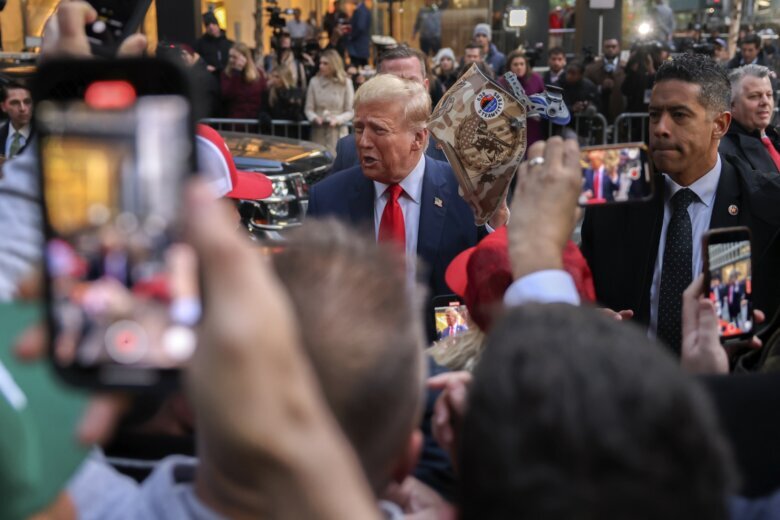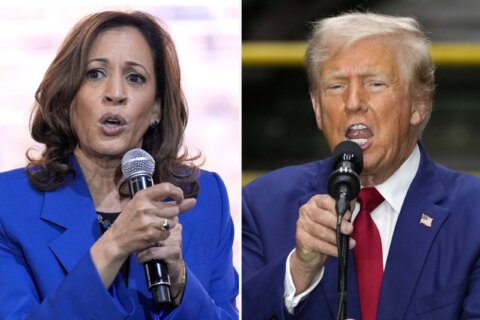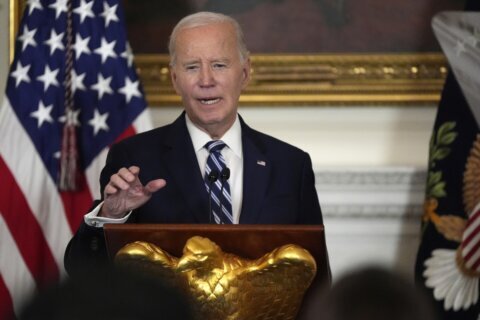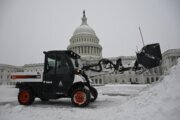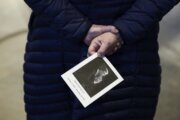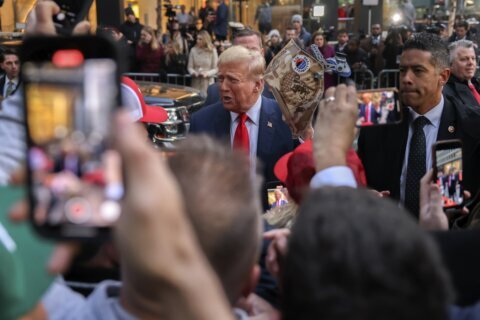
NEW YORK (AP) — Former President Donald Trump has campaigned in one of the most Democratic counties in the nation, holding a rally in the South Bronx as he tries to woo minority voters days before a Manhattan jury will begin deliberations on whether to convict him of felony charges in his criminal hush money trial.
Trump on Thursday addressed supporters in Crotona Park, a public green space in a neighborhood that is among the city’s most diverse and its most impoverished, a change from the majority-white areas where the Republican holds most of his rallies. While the crowd was not quite as diverse as the South Bronx as a whole, it included large numbers of Black and Hispanic voters, and Spanish was heard throughout the crowd.
Trump, in his speech, cast himself as a better president for Black and Hispanic voters than President Joe Biden as he railed against Biden on immigration, an issue Trump has made central to his campaign. He insisted “the biggest negative impact” of the influx of migrants in New York is “against our Black population and our Hispanic population who are losing their jobs, losing their housing, losing everything they can lose.”
Some in the crowd responded by chanting, “Build the wall,” a reference to Trump’s push while in the White House to build a U.S.-Mexico border barrier.
With Trump confined to New York for much of the last six weeks because of his trial, the presumptive Republican nominee’s campaign has planned a series of local stops across his hometown before and after court. He visited a bodega in Harlem, dropped by a construction site and held a photo op at a local firehouse.
But the Bronx rally was his first event open to the general public as he insists he is making a play to win an overwhelmingly Democratic state that hasn’t backed a Republican for president since Ronald Reagan in 1984. Besides creating a spectacle of rallygoers and protesters, the rally also gave Trump an opportunity to highlight what he argues are advantages on economic and immigration issues that could cut into key Democratic voting blocs.
“The strategy is to demonstrate to the voters of the Bronx and New York that this isn’t your typical presidential election, that Donald Trump is here to represent everybody and get our country back on track,” said Florida Republican Rep. Byron Donalds, a potential Trump running mate who grew up in Brooklyn.
The former president opened his rally with an ode to his hometown, talking about its humble beginnings as a small Dutch trading post before becoming a glamorous capital of culture that “inspired the entire world.” While Trump established residency in Florida in 2019, he reminisced on Thursday about his efforts to revitalize Central Park’s Wollman Rink and people he knew in the real estate business.
“Everyone wanted to be here,” he told the enthusiastic audience. “But sadly this is now a city in decline.”
“If a New Yorker can’t save this country,” he went on to say, “no one can.”
Trump called several people with local ties to the stage, including Donalds and the Rev. Ruben Diaz Sr., a former New York City Council member. He also brought up the local rappers Sheff G and Sleepy Hallow, who were indicted last year in a wide-ranging case that includes allegations of attempted murder by the Brooklyn district attorney’s office.
Hours before Trump’s rally was set to begin, a long line of supporters decked out in red “Make America Great Again” hats and other Trump gear snaked around the park, waiting for security screening to begin. People were still entering the park well into Trump’s speech, with some eager supporters sprinting up a hill toward the rally site after getting through security.
The Bronx Democratic Party protested Trump’s appearance with its own event at the park.
Members of multiple unions were present, holding signs that said “The Bronx says no to Trump” in both English and Spanish.
“We are used to elected officials, to government officials, to opportunists of all kinds who come to our community and use our painful history,” said Democratic State Rep. Amanda Septimo, who represents the South Bronx. “They talk about the Bronx and everything that’s wrong with it, but they never get to the part that talks about what they’re going to do for the Bronx and we know that Trump is never going to get to that part in his speech.”
But some locals in the crowd Thursday disagreed.
Margarita Rosario, a 69-year-old who has lived in the borough for over 60 years, said she saw Rep. Alexandria Ocasio-Cortez of New York on television the night before suggesting that the Bronx wouldn’t support Trump. It spurred her to show up, holding a Trump flag and a poster that said, “Make America Great Again.”
“I got so annoyed with that. I said, ‘How dare she speak for the whole Bronx?’” Rosario said.
Muhammad Ali, a 50-year-old who lives in the Bronx and said he planned to vote for Trump in November, said he once used to think the former president was a racist but his views have changed.
“We need a patriotic president at the moment and I find Donald Trump more patriotic for the moment than Joe Biden,” said Ali, an immigrant from Bangladesh and worker for New York’s transportation agency.
At least one New Yorker in the crowd said he knew Trump from his days as a local billionaire real estate developer.
Alfredo Rosado, 62, said he’d been a Trump supporter since 1998 when he worked for several months as a fill-in summer doorman at Trump’s Trump Tower building.
Rosado recounted how Trump had asked his name and stopped to chat. “He’s the same person you see,” he said of the former president.
Trump’s campaign believes he can chip away at Biden’s support among Black and Hispanic voters, particularly younger men who may not follow politics closely, but are frustrated by their economic situations and drawn to Trump’s tough-guy persona.
He’s also argued the indictments he faces in New York and elsewhere make him relatable to Black voters frustrated by the criminal justice system, a statement that was harshly criticized by Biden’s allies.
Biden’s campaign on Thursday released two ads aimed at undercutting Trump’s attempts to make inroads with Black voters, highlighting his propagation of the “birther” conspiracy against former President Barack Obama and his calls for the death penalty for five men wrongly convicted of rape in the 1989 Central Park Five case. A radio ad fictionalizing a conversation between a Trump campaign volunteer and a Black voter will air on national Black radio stations while a shorter television spot will air in major cities, in swing states and on digital platforms, aiming to reach voters in the Bronx near Trump’s rally.
The rally comes during a pause in Trump’s criminal hush money trial. Court will resume following the Memorial Day weekend with closing arguments. The jury will then decide whether Trump will become the first former president in the nation’s history to be criminally convicted and whether he will be the first major party presidential candidate to run as a convicted felon.
The Bronx was once the most Democratic borough in the city. Barack Obama won 91.2% of the borough’s vote in 2012, the highest in the state. Biden won 83.5% of the borough in 2020. Trump garnered only 16% of the vote.
The area Trump visited is overwhelmingly non-white — a departure from most of his rally locations. About 65% of residents are Hispanic and 31% Black, according to the U.S. Census data. About 35% live below the poverty line.
As he wrapped up his speech, Trump said he woke up Thursday uncertain of the reception he’d get in the Bronx.
“I said, ‘I wonder, will it be hostile or will it be friendly?’” he said. “It was beyond friendly. It was a lovefest.”
___
This story has been corrected to show the rappers were charged last year, not this month.
___
Associated Press writers Zeke Miller in Washington and Liset Cruz in New York contributed to this report.
Copyright © 2025 The Associated Press. All rights reserved. This material may not be published, broadcast, written or redistributed.

